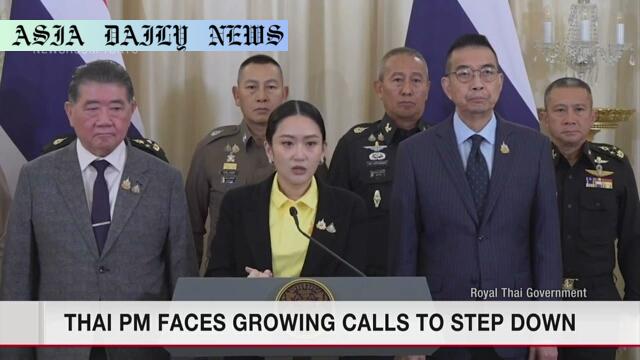Thai PM resignation, Thai Prime Minister Paetongtarn Shinawatra faces intensifying calls to resign following a controversial leaked call.

Thai PM Faces Growing Pressure Amid Leaked Call Controversy
In recent developments, Thai Prime Minister Paetongtarn Shinawatra has found herself at the center of growing political uproar. This turmoil follows the leak of a contentious phone conversation with former Cambodian Prime Minister Hun Sen, currently the senate president of Cambodia. The dialogue reportedly undermined a Thai army commander and has stoked backlash from both within her coalition and opposition parties.
The conversation with Hun Sen addressed ongoing border tensions between Thailand and Cambodia. During the call, Paetongtarn allegedly referred to a top Thai army commander as the ‘opposite side.’ The sensitive wording sparked outrage, with many citing it as inappropriate and disrespectful to one of the nation’s key security institutions. Following this, the prime minister apologized, framing her remarks as a negotiating strategy. While some in political and military circles accepted her explanation, the controversy continues to escalate.
Coalition Turmoil: Bhumjaithai’s Departure
Adding to the intensity of the political fallout is the abrupt departure of Bhumjaithai, previously the second-largest party within her ruling coalition. This move has placed her government in a precarious position. Without Bhumjaithai’s support, Paetongtarn’s coalition may struggle to maintain its majority in the lower house, jeopardizing the administration’s ability to pass critical legislation or even survive a confidence vote.
While efforts to repair relations between Paetongtarn and the military’s leadership were recently displayed with her meeting the army’s regional commander, this act of reconciliation does not appear sufficient in silencing her critics. Executives from the United Thai Nation Party (UTN), the next-largest party in the coalition, have voiced varying opinions on her position. Some call for her immediate resignation, while others remain uneasy but are not outright demanding her departure. Regardless, the cracks within the coalition are increasingly difficult to ignore.
Opposition Demands and the Bigger Picture
The opposition, led by the People’s Party, has been unequivocal in its demands for the prime minister to resign and take political responsibility for the controversy. Leveraging the momentum from this crisis, they have urged for the dissolution of parliament to pave the way for fresh elections. With public dissatisfaction growing amid ongoing political turbulence, these calls are likely to resonate with segments of the population frustrated by what they perceive as ineffective governance and a lack of transparency.
While Paetongtarn and her team are attempting damage control, addressing an array of criticisms—from perceived insensitivity in diplomacy to lapses in communication—her administration faces an uphill battle to restore the confidence of not only her party allies but also the Thai public. It remains to be seen whether effective strategies will emerge to stabilize her government or whether the political pressure will culminate in her resignation or dissolution of the coalition.
What Lies Ahead for Thailand’s Political Landscape?
As Thailand navigates this period of political uncertainty, the leaked audio serves as a potent reminder of the ever-volatile nature of Southeast Asian political ecosystems. The situation also underscores the significance of diplomacy, transparency, and coalition-building in resolving national issues. Whether Paetongtarn Shinawatra successfully manages this crisis to retain her position or becomes another casualty of Thailand’s revolving political door will depend on her crisis management skills and ability to foster trust once more. The coming weeks will be pivotal in shaping the country’s political outlook.
Commentary
Understanding the Gravity of the Political Fallout
The recent crisis facing Thai Prime Minister Paetongtarn Shinawatra is a noteworthy example of how sensitive political missteps can have profound consequences. The leak of a private conversation may appear trivial on the surface. However, when viewed in the context of public office, military relations, and international diplomacy, every word can carry significant weight. In this instance, Paetongtarn’s remarks have been interpreted as undermining a key component of Thailand’s stability—the military. Even with apologies and clarifications, the inability to nip this crisis in the bud early has left her administration vulnerable.
The Fragility of Coalition Politics
The Bhumjaithai Party’s exit from the ruling coalition exposes the fragile alliances underpinning Paetongtarn’s political power. While coalition governments are often necessary in diverse democracies like Thailand, they are inherently unstable. The willingness of parties to defect as soon as controversy arises can instantly collapse any semblance of majority power. This dynamic places extraordinary pressure on leaders like Paetongtarn to walk a tightrope between progressive policies and maintaining relationships within her alliance. Losing majority control means not only facing opposition attacks but also risking critical gridlocks in governance.
Lessons and Reflections Moving Forward
As Thailand watches this political drama unfold, there are lessons not just for the prime minister but for leaders globally. Transparency and effective communication are non-negotiable when managing sensitive situations. Leaders must weigh their choices and words carefully, especially in tense diplomatic or military matters. Moreover, political allies must rise above reactionary tendencies and work collaboratively to address crises rather than destabilize elected governments. Failure to do so ultimately disenfranchises the citizens leaders are meant to serve. Whether this crisis becomes a turning point or further divides Thailand remains an open question, but the stakes have never been higher for Paetongtarn Shinawatra’s future leadership.


